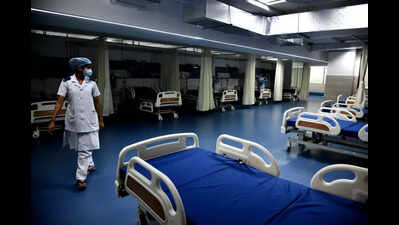- News
- Crores of rupees in funds meant for poor lying unused with Pune charity hospitals
Crores of rupees in funds meant for poor lying unused with Pune charity hospitals
Pune: At least 36 charitable hospitals in the city have crores of rupees in unspent funds they can use to provide free or subsidized care to the financially weaker sections of the society. This data was collected from audit reports submitted in March by 52 such city hospitals to the Pune Charity Commission office.
Charitable hospitals are by law mandated to set aside 10% of their beds for two categories of people: indigent patients and those from the weaker sections. They're also required to aside 2% of their overall billing for the treatment of these two categories. Essentially, if the hospital has issued total bills worth Rs 1 crore in a financial year, it has to set aside Rs 2,00,000 and use this money to provide free or subsidized care for indigent patients and those from the weaker sections. As per the Bombay Public Trusts Act, this separate fund is called the Indigent Patients Fund (IPF).
But an analysis of the audit reports found that most city hospitals governed by the Bombay Public Trusts Act have funds lying unused in their IPF accounts. There are a total of 58 charitable hospitals in the city; six are yet to submit their audit reports to the charity commission.
Those with unused funds in their IPF accounts are some of the largest hospitals in the city. For instance, Deenanath Mangeshkar Hospital, which was caught in controversy recently, had a balance of Rs 35 crore in its IPF account as of March-end. Ruby Hall Clinic had Rs 2.28 crore, Aditya Birla Hospital had about Rs 13.07 crore unused and Inamdar multispeciality hospital had about Rs 73.86 lakhs in its IPF account.
Vinod Sawantwadkar, CEO of Jehangir hospital, which had over Rs 25 lakh unspent in its IPF account, said the balance as of March-end was a "running balance", which was subject to change. "This is the balance as of March 31, 2025. There are months when the hospital even runs a negative balance. The amount should not be seen in isolation, considered as surplus or as non-utilization as hospitals would have admitted patients in the charity category and their discharge may not be in the same month. In this scenario, what we see as surplus tends to get settled later and may go on to become even nil or negative as this fund's creation and utilisation by the hospital works on a rolling basis," Sawantwadkar said.
Behram Kodaji, group CEO of Ruby Hall Clinic said: "In certain years or months there are not enough patients to use up our entire indigent patients' fund. But in some months, we spend over and above the IPF savings. I can assure that whoever comes to our hospitals is fully treated irrespective of whether they are eligible for relief. We also do multiple treatments out of our own goodwill as well."
A representative from Inamdar Multispeciality Hospital which has about Rs 73.86 lakh in its IPF account, said: "We are deeply committed to supporting patients in need, strictly following charity guidelines and ensuring the responsible use of IPF funds. Every contribution is spent with care so that the maximum number of underprivileged patients can benefit from it. We believe that access to quality healthcare should not be limited by financial constraints. That's why we actively create awareness about the availability of these resources, helping more families receive the support they deserve."
Pamesh Gupta, CEO of Aditya Birla hospital, which has about Rs 13.07 crore in its IPF account, said: "Our hospital has voluntarily agreed to abide by Charitable hospital guidelines in May 2015. Since then, we have completely abided by all Charity guidelines and our patient records are duly audited by the Charity Commissioner office on a monthly basis. ABMH has spent 98% of the accumulated amount of Rs 32.12 crore on treatment of indigent patients since May 2015. We have also refunded Rs 38 lakh of valid claims before May 2015 to eligible patients. We remain committed and fully compliant."
Dr Aditya Kelkar, director of National Institute of Ophthalmology, which has about Rs 5.72 lakh in the IPF account, said: "As per the act, charitable hospitals have to save 2% of the annual billings irrespective of the profit margins. So if a hospital has charged Rs 100 from a non-IPF beneficiary then a needy patient is eligible for treatment worth Rs 20. In addition to this, the treatment charged under IPF only includes surgeon's charges, implant cost and medicines it does not include the bed charges, the machinery cost or the other staff charges which we have to often bear. Despite this, in the past one year we have conducted over a 1,000 free cataract surgeries."
Dr Sanjay Lalwani, medical superintendent at Bharati Hospital, which has about Rs 38 lakh in its IPF account, said: "Every month, we transfer 2% of our total billings into the IPF account and about Rs 30 lakh is deposited every month. We are one of the rare hospitals in Pune who are not only running under the charity commission's scheme but are also empaneled under the MJPJAY scheme. At any given time, we have about 125 patients admitted under MJPJAY and 75-100 patients under other govt health insurance schemes. By April-end IPF deposited in March will be utilised."

About the Author
Steffy ThevarEnd of Article
FOLLOW US ON SOCIAL MEDIA








